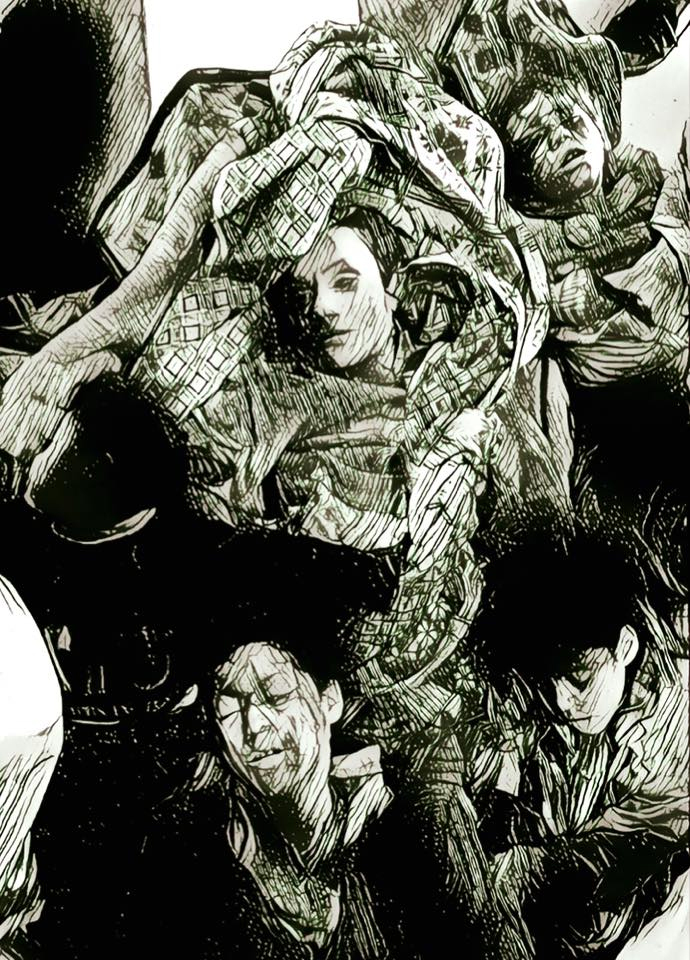“Al Ghouta Children Under Bombing” by Etab Hrieb
If you follow news from Arabic sources, both the traditional and new media, while simultaneously relying on news from Western sources, you will feel as if you were living in a different world. What you hear and read in Western media becomes “fake news,” while credible and authoritative news appears to come exclusively from Assad’s apologists – Arab rejectionists comprised of so-called leftists, nationalists and anti-imperialists, all paying unwavering support and respect to Hezbollah and its fighting machine in Syria and other parts of the Arab world.
Embracing the above media strategy, the rejectionists have actively sought to monopolize the “moral outrage" caused by the American policy of recognizing Jerusalem as the capital of Israel. As part of this strategy, they have ignored inconvenient facts while attempting to convince their audiences of the legitimacy of this moral outrage. One courageous Lebanese Christian cleric, Father George Massouh, however, would not allow this claim to “morality” to stand against the facts. He successfully punctured the myth of Arab rejectionist “outrage” at wide array of injustices, while excluding Syria from their priority list. Although vocal in their outrage over the U.S. decision to move the American embassy from Tel Aviv into Jerusalem, these same rejectionist groups not only remain silent concerning the recent atrocities in Al Ghouta, but have also actively denied other such horrors since the beginning of the Syrian revolution in March 2011. Watching the CBS 60 Minutes News program on February 25, 2018 recently reminded me of this campaign of denials. According to U.N. figures, “chemical assaults have now become routine in Syria with nearly 200 over seven years,” not to mention the nearly half of a million dead, and the internal and external displacement of half of Syria’s population.
Among the many vocal condemnations of this moral hypocrisy, Father Massouh’s voice remains one of the strongest. In an article written in Arabic, published in An Nahar newspaper, on social media, and then translated into English in the forthcoming issue of Al Jadid, Father Massouh punctures the rejectionist myth of supporting the Palestinian cause while also debunking their hypocritical decision process when choosing which causes to support.
With unequivocal clarity, Father Massouh maintains that God assigns more importance to men and their deeds, rather than to mere physical locations, including those assigned sacredness by the Abrahamic faith. He reminds us that it is not “as if God only ever appeared in Jerusalem, and forgot the rest of the world!” and then adds, “Let us imagine that Jerusalem stood stripped of its holy sites: Would we marginalize her as we did with Haifa and Jaffa and Galilee?” The good father also argues that even when a city loses its sacredness, or when a holy place ceases to exist, the legitimacy, faith and meaning that man imbued in it remains. This well-constructed reasoning leads Father Massouh to ask the important question: “Why do we only protest over places of worship, and not on behalf of people?”
Unlike the rejectionist discourse, which readily sacrifices the individual in favor of what they presume to be a higher cause, Father Massouh offers a different view. He states: “Revolutions and intifadas hold no credibility if they do not prioritize the individual, the people without whom these holy places would lose their meaning and their value. The people of Jerusalem, her sons and daughters, remain more important in God’s eyes than her holy sites.”
Father Massouh goes beyond the cause of Jerusalem and the religious symbols. Although he doesn’t specifically name the sites of recent horrors, the good father undoubtedly has the Syrian conflict in mind. “Do the temples of Jerusalem have more value than the blood of those victims?” he asks. “Why do we remain unaffected in the face of such dreadfully high numbers of casualties, even sometimes applauding the killers for taking pleasure in those they have killed, while we revolt over a church or mosque being destroyed? The church and the mosque can be rebuilt. Yet who will return the victims to their loved ones?” Father Massouh's sharp eyes could not have missed the jubilant supporters who roamed some of Beirut’s streets after the Assad or Hezbollah forces inflicted horrific defeats on their presumed Syrian opponents.
Father Massouh doesn’t need to look far beyond Lebanon’s borders to criticize Arab hypocrites and their rhetoric on the Palestinian cause. Exposing the empty rhetoric of the country’s politicians on the human rights of the Palestinians, he asks, “Why do we exploit the Palestinian cause and, specifically, the issue of Jerusalem in times of crisis? Such beautiful rhetoric flowed from the mouths of Lebanese officials about sharing in Palestinian martyrdom and opposition, while in the same moment Palestinians in Lebanon are denied the most basic civil rights guaranteed by international law.”
Similarly, Father Massouh doesn’t take Arab regimes seriously when they kill their own people while repeating mantras of freedom and Palestinian Liberation. Undoubtedly, he refers to the Syrian regime, whose history of brutally oppressing local Palestinians remains legendary, from the 1976 massacres of the Tel al-Zaatar refugee camp in Lebanon to the recent battles of the Yarmouk Camp in Syria. This history stands in stark contrast to Baathist slogans of freedom, and the regime’s feigned concern for the liberation of Palestine, and the securing of human rights for the Palestinian people.
This article appeared in Al Jadid Magazine, Vol. 22, No. 74, 2018.
Copyright © 2018 AL JADID MAGAZINE

